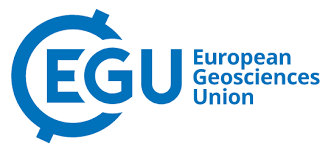About the assembly
The format Sharing Geosciences Online was an exciting experiment in response to the COVID-19 pandemic and a great success. About 18.000 abstracts formed the online programme with 701 scientific sessions. A fantastic number of more than 26.000 individual users joined the live text chats and messages. The online replacement turned into an opportunity to contribute to greener events in the future.
About the contribution of students and staff
In three scientific sessions, Master students and staff Environmental Sciences presented their research work on Integrated Environmental Modelling. Authors presented their findings in display format and scientific discussions were – quite hectic – done by text chatting and sharing ideas with the conveners and the audience.
- Borjana Bogatinoska, Angelique Lansu, Judith Floor, Dave Huitema, and Stefan C. Dekker:
Co-creation processes of nature based solutions in hydrological modelling – case studies in the UK, Belgium and the Netherlands - Erik Roest, Angelique Lansu, Ton Baltissen, and Stefan C. Dekker:
From Pasture and Cropland to Nut Orchards: Modelling the Dynamics of Carbon Sequestration by Agroforestry Systems in the Temperate Climate Zone - Jaap Bos, Angelique Lansu, and Wilfried Ivens:
The Impact of Charcoal Production for Energy on Tropical Rainforest Resources in Nigeria
Moreover, transfer of knowledge was not limited to these presentations. The EGUsphere platform lists all EGU2020 abstracts, their presentation materials, and corresponding comments available for a broader audience.
About the presenters
Three rookies in Scientific conferencing had the opportunity to present their research in three scientific sessions with an audience of over 100 peers each.
Borjana Bogatinoska, novice PhD-researcher at the Environmental Sciences group, found the online EGU really inspiring: 'The scientific sessions have been organized so effectively that I ended up receiving very good questions and feedback even though I could only present my display and answer questions by chat'.
Erik Roest, MSc Student Environmental Sciences, took the online opportunity to invite supporting masterstudents, and even the orchard farmer of his experiments and the funder of his research project, so creating a participatory environment.
In the well-attended Nexus session prof Stefan C. Dekker (UU, Visiting professor Integrated Environmental Modelling) and Jaap Bos (MSc Student Environmental Sciences) both presented their work.
Pros and cons of an online scientific conference
A lot of colleagues and peer students of the Open Universiteit took the opportunity to attend the online sessions, webinars and courses, which has not been possible in a offline format at Vienna. At some point about 10% of the audience of the session of the Water-Energy-Food nexus had an OU-affiliation. Notable is how the members of the OU-community are used to online sessions.
Borjana: 'All in all, an amazing experience for me in these digital times! But next year, I am looking forward to meeting the conveners, the keynote speakers, the inspiring authors and other scientists in real live at Vienna. By train'.
Angelique Lansu: 'The openness of online conferencing in geosciences, extended to a broader audience including our stakeholders as scientists, is a great advantage. I liked the inspiring displays, webinars and chat sessions, really fitting our online habitat as Open Universiteit'.

